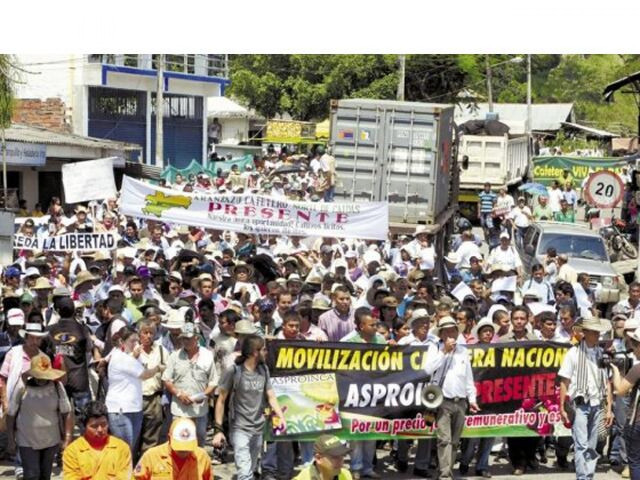Colombia’s General Strike Is Getting The Best Of President Juan Manuel Santos; Truckers, Coffee Workers And Miners Protest For Low Wages And Government Promises Unfulfilled

President Juan Manuel Santos has some problems. Several workers’ unions in Colombia have called on a national strike, which began on Monday -- truckers, miners and coffee workers were the initial instigators of the unrest, and they were later joined by cacao workers, teachers and health care workers.
The Central Unitaria de Trabajadores (CUT), the biggest union in Colombia, released a statement saying the strike is a condemnation "of the situation in which the Santos administration has put the country, as a consequence of its terrible, anti-union and dissatisfactory policies.”
Each group is fighting its own battle, but all of their demands are interconnected: Truckers are protesting low wages and the high prices of gas; coffee workers are demanding relief for their bankrupt industry; and miners are fighting against government interventions.
Santos, in response, said he would not bend to the demands, and he said the country’s budget simply cannot solve all of the countries exigencies.
Some of Santos' opposition parties joined the protest. Polo Democrático Alternativo, a left-wing democratic coalition, and Centro Democrático, the party of former President Álvaro Uribe, took part in the strike, which the government designated “political opportunism.”
The strike picks up from last March, when farm workers blocked the main roads of the country for 12 days and left several provinces without supplies. Santos managed to stop the strike after two days when he promised to raise the minimum wage for farmers, but his negotiations were not successful in eradicating the fury.
The first day of the strike did not cause major problems: Since it was a holiday in Colombia, the blocking of roads in 20 provinces did not affect the transportation of either workers or supplies. The national police stopped the protesters from blocking the main roads, and demonstrations were largely peaceful.
The most tense situations occurred in Buga and Tuluá, in the coffee region of Cauca, where 300 strikers managed to block a road and fought with the police. Twenty-two people were arrested.
Unions reported that 60,000 people took part in the demonstrations. However, Colombian police said up to 12,000 participated.
Santos said on Monday night that the strike had not been as big as expected. “I want to thank the citizens for their collaboration in giving out information to the authorities, who were able to keep the situation under control,” he said to Colombian newspaper El Tiempo.
Minister for Homeland Security Fernando Carrillo said the government had opened the way to dialog with all of the striking unions. “We will continue to be open to negotiations as long as the protests remain peaceful.”
A survey conducted by Colombian media after demonstrations in March found that more than half (53 percent) of Colombians think the president does not know how to contain the strikes and demonstrations.
© Copyright IBTimes 2025. All rights reserved.





















